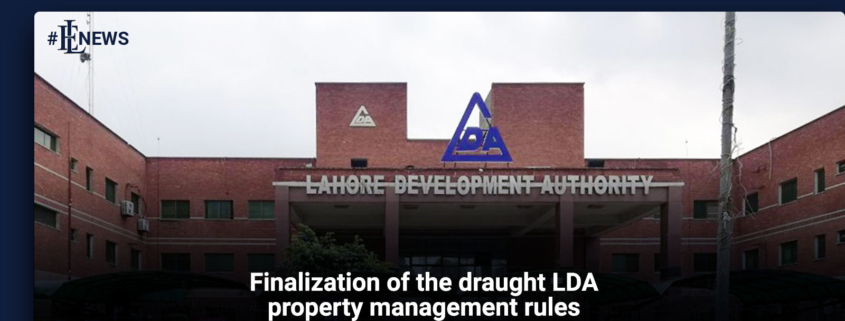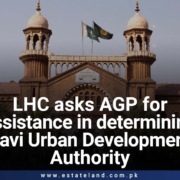Finalization of the draught LDA property management rules
Finalization of the draught LDA property management rules. Lahore Development Authority (Joint Venture) Regulations, 2021, have been revised and are likely to be approved by the LDA’s governing body in the next meeting.
If you look at a document, Section 5 of the Management and Transfer of Properties by Development Authorities Act 2014 (the Act) says that the development authorities can run their properties through joint ventures. Section 20 of the Act allows the government to make rules to carry out the Act’s purposes, and Section 21 allows an Authority to make rules.
On November 26 and 27, 2019, the LDA (the Authority) put together a draught of the Joint Venture Rules for the government to look at. The government went through many consultations before putting the Management and Transfer of Properties by Development Agencies (Joint Venture) Rules 2020 into effect on October 10, 2020, through a Notice in the Official Gazette.
The Lahore Development Authority (LDA) Director General set up a committee led by the Additional Director General (Urban Planning) to write the Management of Properties of Lahore Development Authority (Joint Venture) Rules. The Committee talked to the people who were affected by the regulations and came up with a draught of them. Then, the Director of Law for the High Court and the Supreme Court looked over the draught. The Senior Legal Advisor for the LDA also looked it over. Then, the vetted draught was put on the website of the LDA to get feedback from everyone, including academics, professionals, and the general public, the document says.
According to the document, the draught was finally revised and will be put before the LDA’s governing body for approval at an upcoming meeting. This is because the LDA’s governing body has the power to make decisions under Section 21 of the Act.
Read more with EL news : UAE will expand its hospital capacity in Sindh, according to an envoy
If the DG wants to make joint venture proposals, he or she can put an ad in the newspaper or talk to a government agency about creating a joint venture proposal, or the DG can accept an unsubmitted proposal for managing LDA property. The DG can do all the things that are needed to make these things happen, according to draught regulations.
People who want to talk about joint ventures have set up a committee under section 4 of the regulations. The committee will deal with issues about joint ventures and perform such other tasks as the DG wants. Among its members: an extra director general for housing, the chief metro planner, the chief town planner, the director of housing-X, the director of housing, the director of engineering-I, the director of finance, and an officer chosen by the director of housing.
The Joint Ventures Committee can set up subcommittees, or it can ask any of its members to do what it wants to do. Joint Ventures Committee’s recommendations will help the Director General decide what to do. The Director General will be able to use all of the authority’s powers for the joint ventures. The committee may do or have done any studies, surveys, data collection, data analysis, and other things that are needed to evaluate a joint venture proposal and may spend money on them.
There is no need to be more concerned about the generality of sub-regulation (4). The committee can hire or allow the hiring of any professional, technical, or other person that it thinks is necessary for a joint venture.
The regulations say that LDA can work with a government agency to come up with, plan, and carry out a joint venture without open competition on terms and conditions that both parties agree to. If it comes with a feasibility study and a draught joint venture agreement, the LDA might be willing to look at an idea that wasn’t asked for.
The Joint Ventures Committee may do a full review of a proposal that was not asked for, including its technical feasibility, environmental viability, financial health, and legal correctness. If it doesn’t ask for a proposal, the committee can reject it, recommend it to the DG with or without changes, or ask the private party to send the committee any information, record, or other material it needs to make a final decision.
As soon as an unsubmitted proposal is approved, the private party that submitted it will be able to participate in the bidding process. This is called “pre-qualifying.” The private party that comes up with an idea that wasn’t asked for will get 5% more points for its technical proposal.
The private person who came up with the idea without being asked will be able to match the best offer that came from a competitive bidding process. The committee will decide how much the winner of the bid should pay the private party who came up with the idea without being asked. They will also decide how and when the winner will be reimbursed. To be a citizen of Pakistan or to be a natural or legal person who lives in Pakistan is not a condition for making an unsubmitted proposal.
Under Section 7, a joint venture agreement can include all information that is relevant to a joint venture. The Director of Law (High Court and Supreme Court) will look over the joint venture agreements before they are signed.
It’s possible for DG and a partner to set up a special business for a joint venture project in Section 8. The DG and a partner can transfer property and other assets to an SPV on such terms and conditions as they agree to, as long as both agree. This means that the DG may allow the transfer of funds to an SPV or to a partner in accordance with the joint venture agreement even if the work has not been done, the goods have been delivered, or the services have been provided for which they were meant. If this is deemed to be mandatory and in the public interest, the DG will let this happen.
Keep up with Estate Land Marketing for news and updates.







Leave a Reply
Want to join the discussion?Feel free to contribute!